Riley Gaines vs. the world
The anti-trans speaker who graced UW last week misunderstands the debate she’s joined, and some of her comments dipped into truly troubling territory.
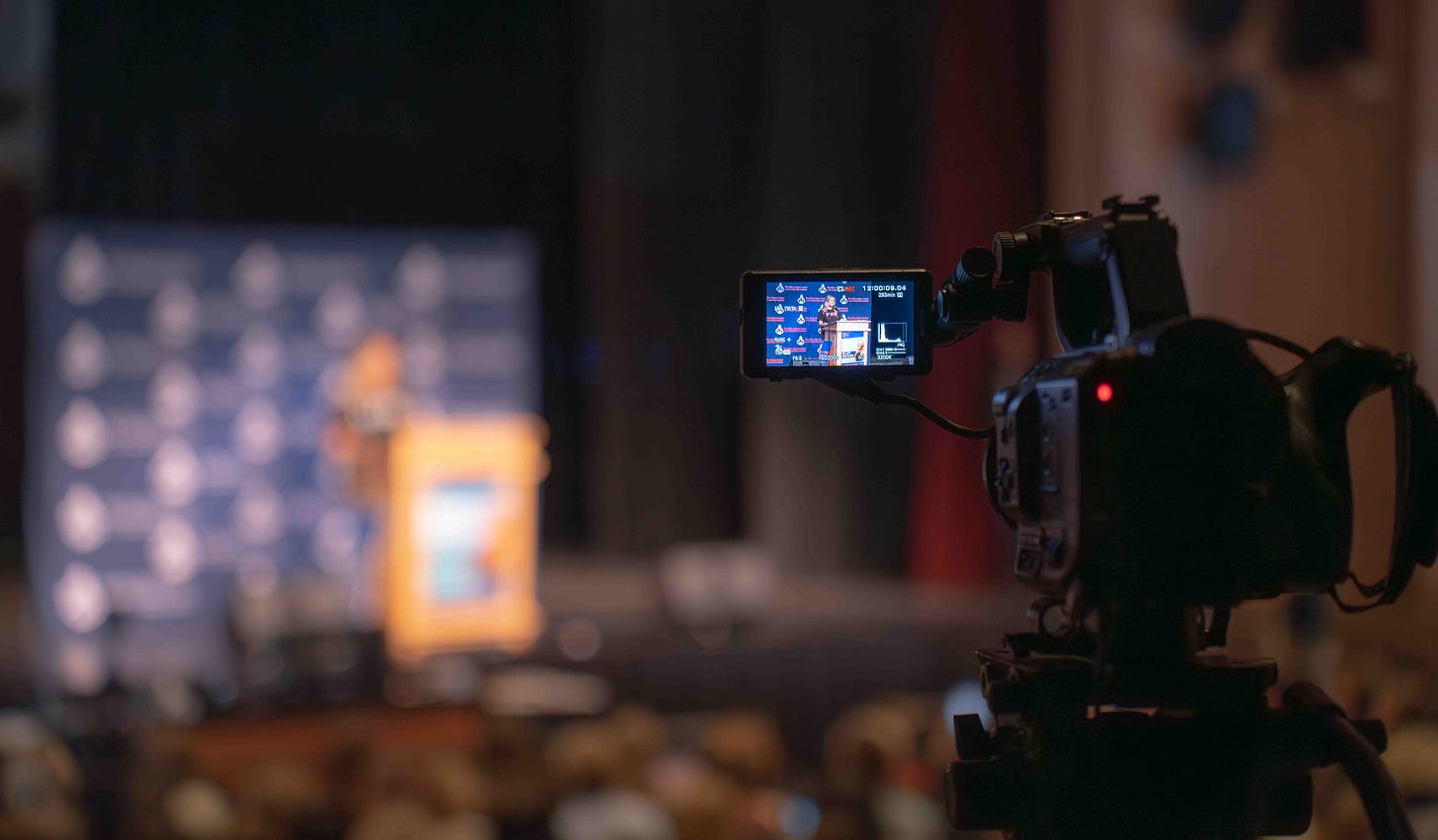
Former NCAA Division I swimmer Riley Gaines addressed a full auditorium at the University of Wyoming last week. She recounted her own experiences as a college swimmer and how both those experiences and her Christian beliefs shaped her feelings about trans people.
In short, Gaines argued that transgender women should not be allowed to compete in women’s sports. Gaines’ speech wove through her own memories, along the way making claims about biology, law and culture that were not always true.
Much of Gaines’ speech was simply mean-spirited. In a passing reference to the U.S. Assistant Secretary for Health Rachel Levine, Gaines made sure to mention she was fat. In a separate comment, Gaines questioned whether Democratic politicians deserved to keep their children, suggesting Child Protective Services should get involved if their parents thought trans-inclusive policies were acceptable. Sharing a story about a transgender male swimmer from Yale, she said it was like “a South Park episode” watching him lose to everyone but a competitor “with one arm.”
But a significant amount of the speech presented either outright falsehoods or exaggerated statements. One such falsehood saw Gaines claiming that health officials were pushing the term “bonus hole” as a trans-inclusive euphemism for vagina. This is not true and has been debunked for a while, but the falsehood continues to circulate as a right-wing talking point.
One example of exaggeration came when Gaines said Biden was “rewriting” Title IX, the federal law that demands gender equality in educational settings.
The president cannot rewrite the 1972 law that contains Title IX. But like Obama and Trump before him, Biden could set out his own guidelines for interpretation. He has yet to do this, and when he does, it’s almost certainly not going to prohibit bans on transgender inclusion in high school sports.
The Laramie Reporter analyzed Gaines’ speech, checking on the verifiable claims she put forward both during that speech and during the question-and-answer session that followed. Rather than provide an account of each individual claim, this editorial aims to address the main themes of Gaines’ speech, highlighting where she misunderstands or misrepresents reality and where her rhetoric serves to further oppress a marginalized community.
Gaines overstates the science by assuming she already knows what it will find
Gaines’ central claim — the assertion that underpins her entire speech and career as an activist — is that transgender women have a clear, indisputable biological advantage over their cisgender counterparts in most or all sports. This was presented throughout Gaines’ speech as a given, a fact so clear it needed no supporting evidence or scientific study, a truth that most people in her audience assumed to be true.
But the people studying this issue — and those grappling with how to make elite sports both fair and inclusive — are not so sure.
As most topics in science are, the answer is more complicated than assumed, and well beyond the capabilities of Gaines — or this reporter — to fully explain. But one example sheds some light on the complexity.
Hemoglobin levels are important for endurance sports, and men tend to have higher levels than women, which partially explains their tendency to outperform women in this particular category of sport. Those levels are tied to sex hormones so transgender women undergoing hormone therapy see their hemoglobin levels fall to the level of cisgender women. Does that mean transgender and cisgender women now have the same oxygen availability for endurance sports? Does an athlete’s time spent training in a body shaped by male puberty continue to confer advantages even after hormone therapy? These are complicated, open questions — which is why one study can find that differences between trans and cis athletes fall away after just a few weeks of therapy, but other studies can find those differences persist a year or even two years later.
The science is still out, but Gaines confidently claims certain results because she once tied for fifth place in the 200 freestyle with transgender swimmer Lia Thomas. Thomas became famous for another event, the 500 freestyle, where she became the first transgender athlete in NCAA history to win a national championship.
Thomas was already a top athlete before transitioning, when she started her college career competing against men. She had to meet NCAA hormone therapy guidelines before being allowed to compete on women’s teams and, during this transition, her time for the 500-yard freestyle — where even fractions of a second matter — fell by about 15 seconds.
Thomas is not the greatest female athlete to ever compete. She is not even the greatest in her sport, where cisgender women still hold all the records.
It is not clear — and it’s certainly not self-evidently true — that Thomas won the NCAA Division I National Championship for the 500-yard freestyle solely because she is transgender. She never won the championship in any other event. And she would have lost in the 500-free had she competed against better cisgender swimmers, such as Katie Ledecky, who was 9 seconds faster than Thomas when she won the event in 2017.
To put it bluntly, we don’t know the exact interplay of complex systems like puberty, hormone therapy, and on-the-field or in-the-pool performance. It might be true that Thomas has an advantage over swimmers like Gaines because of the male puberty she experienced. It might also be true that she doesn’t, that she lost any advantage she had during her transition, and is simply an extraordinary athlete. It’s also possible that those who go through male puberty have an advantage but that trans youth who are allowed to take hormone blockers, thus avoiding the “wrong” puberty, do not.
Scientists are still working on it. And the professionals, athletes, human rights activists and others trying to establish fair but inclusive guidelines for elite sports are trying to work out what to do to best serve athletes — both transgender and cisgender — while those scientists study away.
In other words, there are serious people having serious conversations about this. That is not, however, the way Gaines presents it.
Gaines mischaracterizes the debate
It is important to note that the debate surrounding transgender women in sports is not between those who want an absolute ban and those who want no rules whatsoever. Gaines fails to mention this and presents her ideological opponents as idiots or liars. But all the available evidence points to a sports world that is earnestly grappling with both threats to inclusivity and threats to fairness.
During her speech at the University of Wyoming, Gaines quoted from the International Olympic Committee’s policy on fairness, inclusion and nondiscrimination. She highlighted, with an imperfect paraphrasing, a section that notes no athlete should be excluded because of “an unverified, alleged or perceived unfair competitive advantage due to transgender status” and that evidence of a biological advantage is needed to exclude transgender individuals.
Gaines summarized that provision as follows:
“The Olympics literally just told you that there’s no difference between men and women. I beg the question, if that’s the case then why do we even have women’s sports? Of course, they know there is a difference between men and women but they’re straight up lying through their teeth.”
This is not an accurate summary of the policy Gaines quoted. That policy notes the need for different men’s and women’s divisions. In some respects, that is the point of the document, which provides guidance for sports associations around the world to develop rules that make sex-specific sports possible.
“Where eligibility criteria must be set in order to regulate the participation in the women’s and men’s categories, the establishment and implementation of such criteria should be carried out as part of a comprehensive approach grounded on the respect for internationally recognized human rights, robust evidence and athlete consultation,” the Olympic policy states. “In doing so, precaution should be used to avoid causing harm to the health and well-being of athletes.”
In other words, the policy recognizes the need for men’s and women’s sports and urges rulemakers to balance the desire for fairness with respect for diversity and equal opportunity. It also makes a distinction between elite and lower level sports, arguing that lower level leagues should prioritize inclusivity, since their main benefit to society is providing youth and others with access to physical activity and communal involvement.
The policy recognizes the multi-faceted reasons humans come together on a field or in a pool, adding those considerations to what is ultimately a nuanced discussion.
Further, the Olympic policy is non-binding for sports associations outside of the Olympics themselves. It’s meant as a guidance document for the various clubs and leagues around the world that have set their own rules on transgender inclusion for years. The NCAA has had policies surrounding transgender inclusion since 2010. The Wyoming High School Sports Association has had policy in place for nearly a decade, long predating the culture war fascination with the issue.
There are serious people having serious discussions about this issue. But Gaines side steps all of that. She presents the debate as being between people like herself — who support total bans on transgender athletes — and those who oppose her — who presumably want no rules whatsoever. In Gaines’ view, these opponents are either deluded or they secretly agree with Gaines and are just scared of what transgender activists will say of them if they don’t go along with the ruse.
For Gaines, there is a “silent majority” who sees through the bullshit, and then there’s a dangerous minority who has the sports world in a vice.
But this framing of the conversation only makes sense to those who have a warped view of the national debate.
There is indeed a faction of people like Gaines and many in Wyoming who are pushing for the total exclusion of transgender women and girls from high school, collegiate and professional sports — no matter how much male puberty they did or didn’t experience, no matter what their hormone levels are, no matter any other possibly relevant factor.
The opposing faction is not, as Gaines would have her audience believe, a faction that pretends not to see sex differences.
No, the other faction is everyone else involved in this conversation who is taking a measured, careful approach to a complicated topic where much of the necessary science is still missing. This is evident to anyone earnestly following the debate.
Take, for example, the discussion surrounding Wyoming’s new sports ban.
Beginning this school year, transgender girls and women in Wyoming high schools are forbidden from competing on sports teams consistent with their gender identity. This is thanks to a new statute that Gov. Mark Gordon labeled “draconian” even as he let it become law.
The bill got significant attention as it snaked its way through the Wyoming Legislature.
The debate was not between those who supported a ban and those who didn’t. The debate was between those who wanted a total ban with no exceptions and those who thought the topic deserved more nuance.
Sara Burlingame, representing the state’s preeminent LGBTQ rights advocacy group, put special emphasis on this request for nuance.
“We don't have the director of the statewide equality group saying, ‘No matter what kind of physical dominance or advantage a trans student may have, they must be able to play no matter what,’” she said, adding the issue deserved a more delicate approach. “The answer is not always. But the answer also shouldn’t be never.”
Burlingame said there is room for conversation, something Gaines evidently doesn’t believe. As the rest of the world studies the issue to develop a stronger scientific grounding, as sports associations work through their own policies with a wide range of stakeholders, as athletes work through their own thoughts on the matter, as others voice their strong support for the rights of competitors like Lia Thomas, Gaines is traveling the country pushing for total sports bans at all levels.
So why is someone who has made this conversation their entire identity so profoundly uninterested in grappling with difficult questions? And why would she mischaracterize the positions of those with whom she disagrees?
Probably because Gaines does not believe the topic is nuanced. The International Olympic Committee recognizes a tension between maintaining fairness in sports and respecting values such as inclusivity and human rights. But there’s no tension if you only believe in one half of that equation.
Gaines says she’s not anti-trans, but she is
Since launching her activist career, Gaines has been labeled “transphobic,” a charge she said “has no validity.”
But if she isn’t transphobic, it’s not clear who would be.
It’s impossible to know what’s in someone’s heart, but if Gaines was solely concerned with fairness in women’s sports, there are ways in which she could signal her support for the transgender community while pushing her cause.
For example, she could use her platform and her prominence in conservative circles to push for gender-affirming care for youth — something that is actively under attack. Gender-affirming care is life-saving healthcare and is recommended by every major medical and pediatric association in the country. Like all major medical decisions, it’s not something that’s undertaken lightly. Youth and their parents consult with medical and mental health professionals at length before undergoing even early interventions, such as taking reversible hormone blockers to delay the onset of puberty.
Ready access to hormone blockers might even benefit fairness in women’s sports as it will allow youth — and future elite athletes — to grow up without experiencing the “wrong” puberty. Outside of that, hormone blockers give youth more time to figure out their identity and determine the right path for their life. And gender-affirming care — from social transition to hormone blockers to hormone therapy — is life-saving medicine.
Trans youth contemplate suicide less in communities where their identities are respected. That includes schools and families using their preferred pronouns, but it also includes having the freedom to make their own medical decisions free of government intervention.
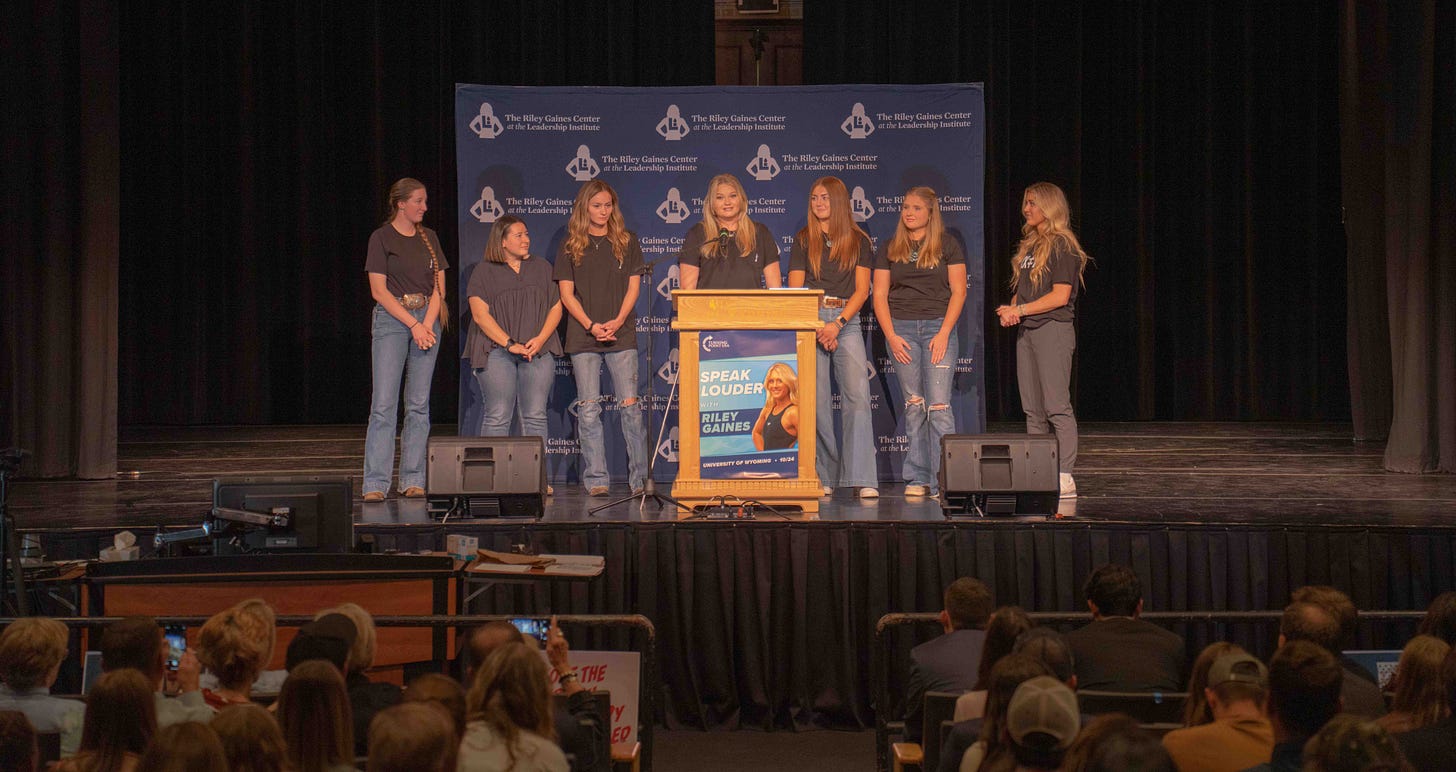
Gaines could speak out about what she perceives as a threat to fairness in sports, while also educating her audiences about the necessity of gender-affirming care, about the legislative assaults on youth access to that healthcare, or about the rampant violence visited upon transgender Americans.
But she doesn’t do this. In fact, she opposes mainstream medical opinion on the matter, believing she knows better than the doctors administering care.
“When we affirm these delusions, we’re putting a band-aid over the problem because what people struggling with gender dysphoria need is appropriate care in regards to their mental health,” Gaines said during her speech last week.
But the research shows that gender-affirming care up to and including medical transition is good mental healthcare.
“The scholarly literature makes clear that gender transition is effective in treating gender dysphoria and can significantly improve the well-being of transgender individuals,” finds a systematic review of the scientific literature published by Cornell University’s What We Know Project.
Gaines is opposed to transgender inclusion in sports, transgender inclusion in sororities, and access to professionally recommended healthcare for trans youth. She does not use her platform to highlight any of the struggles faced by this marginalized community and does not appear to have educated herself on those struggles. But she does use her fame to spread fear about the transgender “agenda” and to advocate against medical best practice.
If this isn’t transphobic, what is? Mass murder carried out the night before Transgender Day of Remembrance would certainly qualify. But surely, many other actions short of murder qualify as anti-trans and transphobic.
Gaines’ assertion that she is not hateful is not in itself enough to dispel the accusation of transphobia. Given what she says on stage and what she doesn’t, critics are in no way off base labeling Gaines an anti-trans speaker.
And they’d be justified in suggesting other labels as well.
Gaines’ speech dipped into common fascist rhetoric
Yes, this is a big claim. And if Gaines and her supporters are unwilling to accept the label “anti-trans,” they are likely to balk at the idea of being called “fascist.” So let’s clarify something.
No one is suggesting that Gaines has a secret 1488 tattoo or that she has extremely specific opinions about who runs the global banking system. No one is suggesting that she is a card-carrying white supremacist.
But she does traffic in meme-ified fascist talking points. It’s possible these talking points come to her by routes so circuitous she does not know their origin. That doesn’t make them less problematic.
During the question and answer segment, Gaines repeated a quote she didn’t source. It comes from the novelist G. Michael Hopf:
Hard times create strong men, strong men create good times, good times create weak men, and weak men create hard times.
The quote presents a simplified and cyclical account of history in which societies like the Roman Empire or the modern United States grow comfortable and effeminate, bringing about their own downfall at the hands of less comfortable and more manly adversaries.
This is bad pop history and is routinely rejected by actual historians. It’s simply not true. But it is how fascists view the world.
To be clear, both fascists and non-fascists have spread this meme, but it benefits the former camp to have the latter camp unknowingly spread their ahistorical rhetoric.
Defining features of fascism include both an aggressive expression of masculinity (machismo) and contempt for the weak. That’s according to Umberto Eco, the philosopher who famously defined fascism as it appears across cultures and times.
But machismo and contempt for the weak are not the only fascist tropes identified by Eco and present in Gaines’ speech.
Far more compellingly, Gaines characterizes her political opponents as both threatening and impotent — capable of dealing great damage but also somehow unable to land a real blow. As Eco put it, the audience must be made to believe in the threat but also made to believe they will inevitably triumph. “By a continuous shifting of rhetorical focus, the enemies are at the same time too strong and too weak,” he writes.
It’s not difficult to see this dynamic at work in Gaines’ speech. She presents the struggle against transgender acceptance as “spiritual warfare” between “moral and evil.” At one point, she said:
“In the name of love and tolerance and welcoming and accepting and whatever other word they want to use, it’s the most hateful, vengeful, violent movement.”
But just minutes later, Gaines told her audience that this “violence” was only “cancel culture” and couldn’t actually hurt them.
“The risks are real. You get called some names, you might have people rip up a poster and walk out of the room and tell you to love your neighbor,” she said, referencing some protesters who had taken seats in the auditorium and marched out 20 minutes into the speech. “Understand that it is real, but it is merely name-calling. What should be scarier to all of us than those things is not standing firm in the truth.”
Gaines reiterated this point later during the Q-and-A.
“I think we’ve built this idea up in our head,” she said. “I’m not going to say that there isn’t backlash at all. Like I said, there is name-calling, there is people commenting on social media. But that’s really the extent of it.”
According to Gaines, name-calling “is really the extent of it” when it comes to what the “most hateful, vengeful, violent movement” can muster.
Very strong, but very weak.
Again, this isn’t evidence that Gaines is herself a fascist. As with the accusations of transphobia, no one can say what’s in another’s heart. But the rhetoric she employs does not exist in a vacuum. Whatever her intentions, spreading misinformation about weak men and hard times, or painting the enemy as simultaneously strong and weak, help turn the soil for more explicitly fascist notions to take root. It’s no coincidence that, throughout the modern era, trans and other queer people are frequently and consistently targeted by fascists.
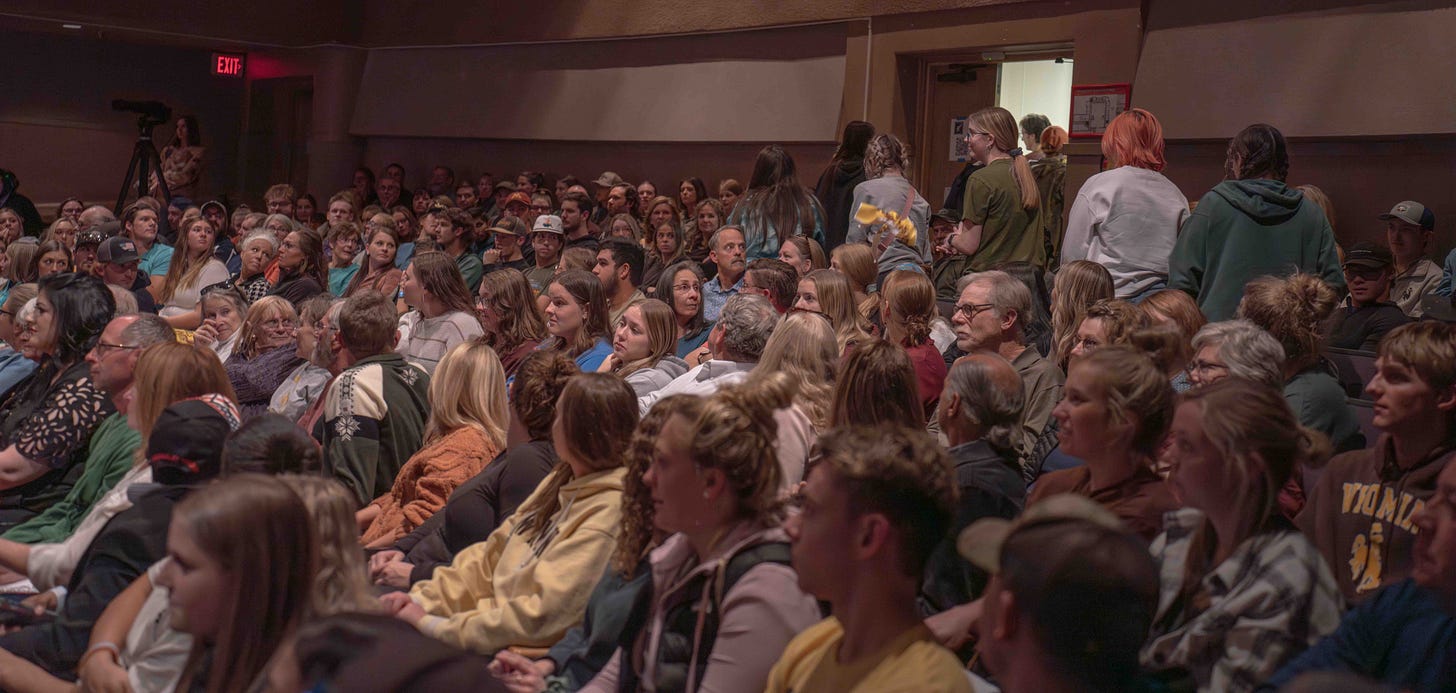
In the modern Internet Age, people are not recruited into these harmful ideologies by attending their local Neo-Nazi chapter meeting. They are prepared by ironic memes and half-truths or falsehoods of the sort Gaines provides. They are invited to the edge of a rabbit hole by seemingly innocuous but easy solutions to the problems in their lives. They are coaxed down that rabbit hole by algorithms that favor extremism but also by the sense of purpose and community that many, across the political spectrum, find in radicalization.
It’s a complex process, one that is difficult to disentangle and even more difficult to dismantle. But the careless spread of ahistorical talking points, the bias-confirming fear-mongering, the flattening of a complex issue to “moral vs. evil” do nothing to counter fascism’s pull.
On the topic of transgender inclusion in women’s sports, serious people are having serious discussions. Gaines demonstrated that she has no interest in coming to the table on those discussions, preferring instead to preach to crowds who already largely agree with her. She does not seem to be aware of the extreme violence and discrimination facing the trans community, or else does not believe it’s worth commenting on as she travels the country speaking to conservative communities.
Riley Gaines has only an impressionistic understanding of the debate she feels compelled to join. Despite her personal story, her only contributions seem to be recycled talking points.
To be clear, she’s free to join the conversation she pretends isn’t happening. She just wouldn’t be a leading voice. Her opinions would be overshadowed by the hundreds of cisgender college swimmers who support trans inclusion in some way, shape or form. Her knowledge-base would be dwarfed by that of the scientists and officials who have been grappling with the issue since Gaines was a child. Her absolutism would be rejected by all the people seeking balance and compromise.
Frankly, she wouldn’t get as far joining that conversation as she has on the right-wing speaker circuit.
So instead, she is poisoning the well for those who do wish to grapple with these issues. She misrepresents the current debate, collapsing an ongoing conversation into “spiritual warfare” where the army of God must forcibly take back a “godless” society. In doing so, she serves the purposes of those who wish to harm the transgender community. She might be doing this unwittingly, but that’s no excuse for someone with such a significant platform.
Those who find themselves on stage or at the helm of a local news outlet have moral responsibilities above and beyond those with lesser platforms. That exalted position demands more careful consideration of what we say and what we don’t and how nefarious factions might use what we say to achieve monstrous ends.
It’s unlikely Gaines will read this article. And if she does, it’s unlikely she’ll take it to heart or incorporate its critiques into her future engagements. It’s possible she flattens this whole rebuttal as she has flattened other debates and criticisms in the past — perhaps telling some future audience about the half-remembered time someone in the media “called her a fascist.”
But I’m not writing for Riley Gaines. I’m writing for my community and for the hundreds of its members who attended Gaines’ speech the night she stopped in Laramie. We don’t all have the platform Gaines does, but we do all have at least some say in our community, our society, our local and state government.
So it’s worth scrutinizing where we get our information, and rejecting or confronting those who don’t. And if you feel compelled to join this conversation in particular — this space where athletes ponder the meaning of sport, where thoughtful people take up thorny questions of fairness and equality — it’s a good idea to read up on the debate before diving in.




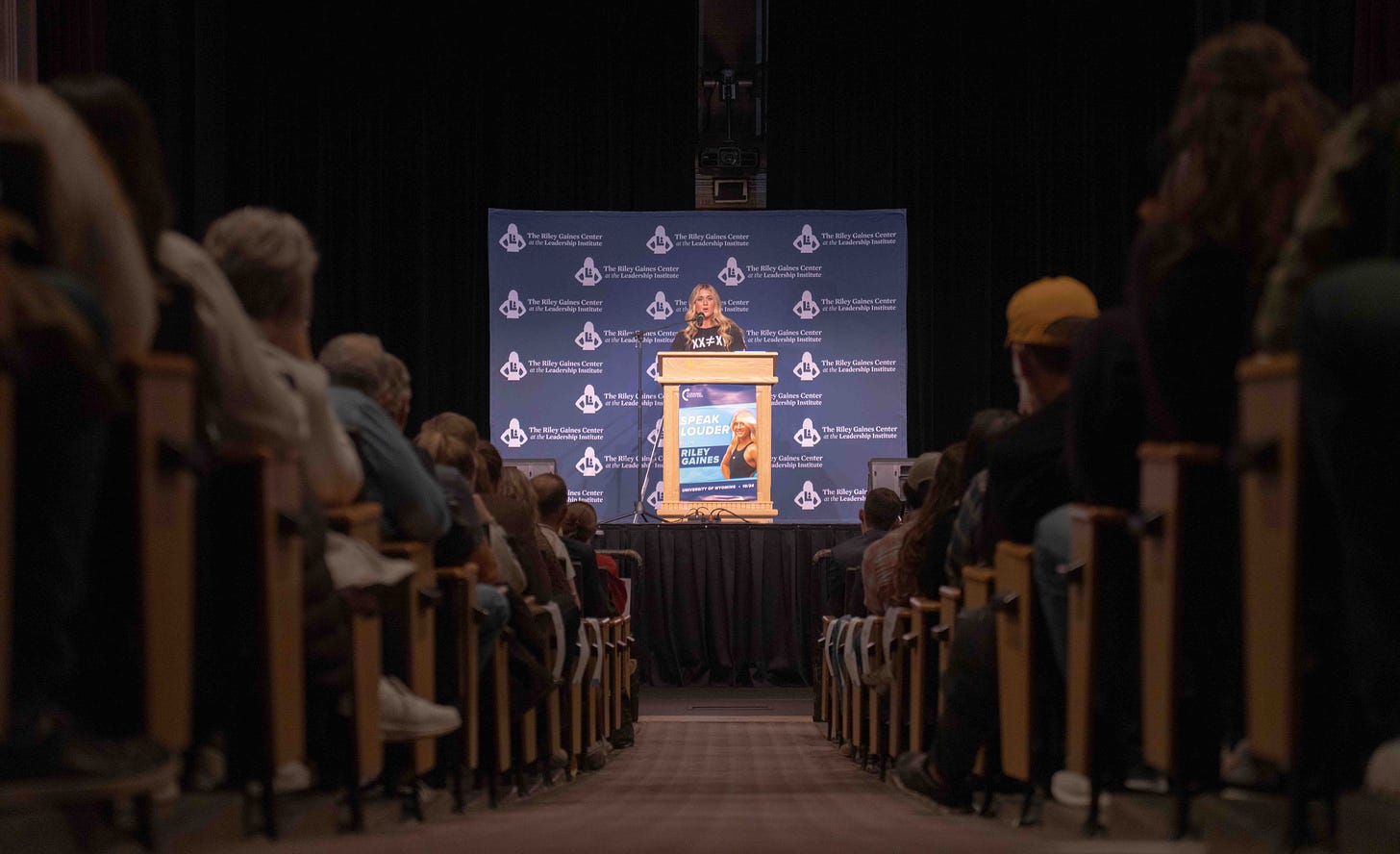
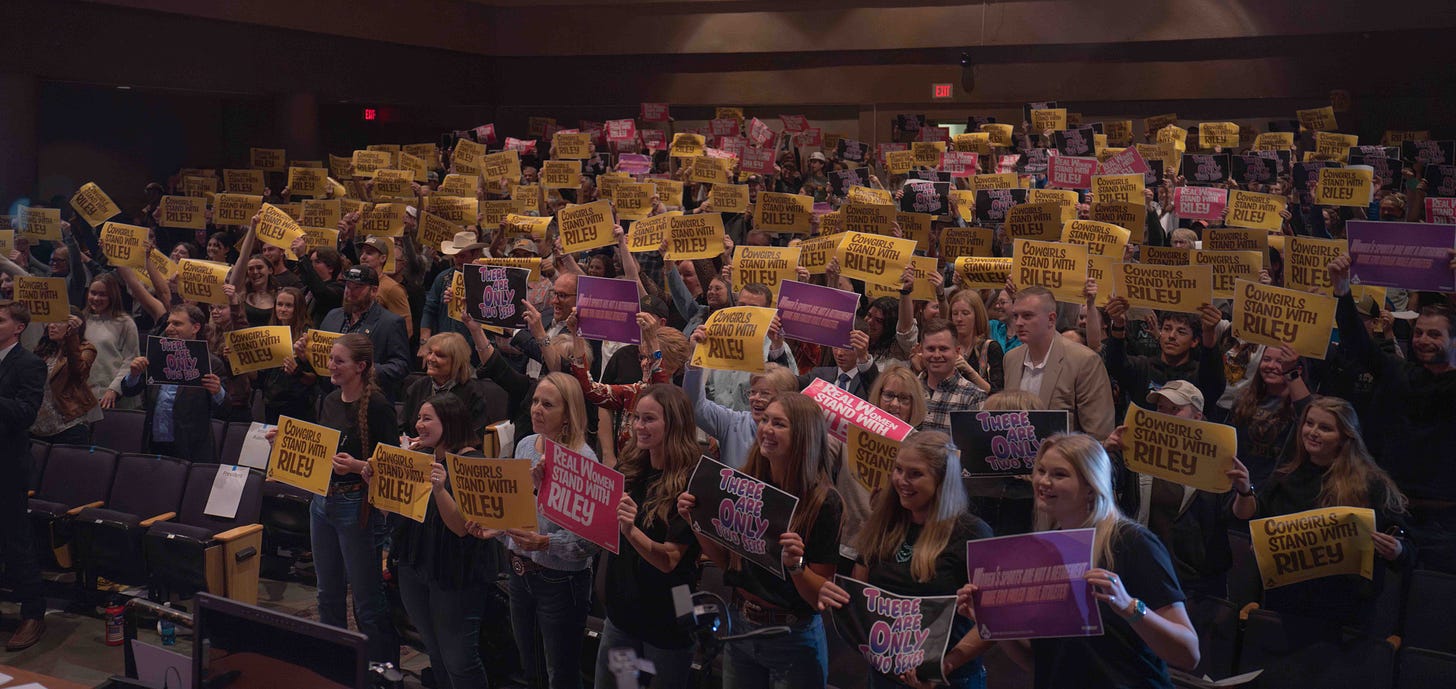
One of the most frustrating things about this whole sports culture war is that because most people aren't knowledgeable or invested in women's sports, and trans athlete does well is notable while "trans woman is mediocre at sports" is extremely not noteworthy, when combined with pervasive misconceptions about trans people and transition it's incredibly easy to come of with the idea that we're dominating women's sports when we just aren't.
That's what makes it such an attractive topic for transphobes, the disinformation is practically automatic, so it's incredibly easy to start slipping in disinformation. Riley Gaines is on the heavier side, but the pipeline starts as easily as comparing cis men and cis women's performance as if cis men and trans women are analogous, when to my knowledge every elite trans woman athlete is *at least* undergoing hormone replacement therapy, which does literally change your secondary sex characteristics, I'd know.
There's another grain of the typically fascist weak-yet-strong thing happening there, if you listen to transphobes talking about sports you'd think medical transition does next to nothing to change our biology, but then they'll turn around and talk about the permanent and drastic changes gender affirming care brings when trying to ban it. And from the way some transphobes obsess over their testosterone levels it's hard to believe they really think feminizing HRT would have no effect on athletic performance.
This author is so misinformed and biased it just proves Riley's speech and beliefs to be true. Such a poorly written and l o n g article is an embarrassment for journalists without considering the misinformation.